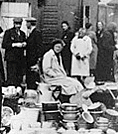 |

|
Transcript
"So
when you came to the ghetto there was this dreadful
dreadful smell. It was in the winter, and it was
freezing, and you could smell rotten cabbages
and beetroot; there was this smell of beetroot.
And what we were given was beetroot soup, which
I couldn't eat at first, it was so awful. It wasn't
a sort of good beetroot soup, it was terrible
beetroot soup, it was just water with bits of
beetroot swimming in it. And I couldn't eat it
for a few days, but then I was so hungry I ate
it and didn't get enough of it. Or it was cabbage
soup made of rotted cabbage, and I think we got
a loaf of bread a week, and I think a little bit
of sugar we got sometimes. And then we got what
they called coffee, it was just a sort of brown
water, it wasn't really coffee, and with that
you cleaned your teeth and did everything. Another
thing I remember on that first day is that cart
where they picked up the dead people, you know,
when people died they came and collected all the
dead people from the rooms, or out in the street,
and just shoved them onto this sort of, like a
cart, took them away. And people standing outside
wailing you know, if a relative died, and get
these people to collect them and they stood out
there, wailing. It was very very frightening,
because people didn't do that in Czechoslovakia,
all this wailing and moaning and shouting and
crying and screaming, all that. That was our first
day in the ghetto. It was a very very severe winter,
and people didn't have fuel, they didn't have
food enough. They got diseases, they got typhus
and typhoid and dysentery and all kinds of diseases.
And lots and lots of them died, thousands of people.
We… there were a lot of children my own age
whom I knew in that same building, and we did
sort of… we found a place in the, there was
a sort of attic, and we used to gather in the
attic sort of place, sing songs and make up plays,
and talk, and played games, you know, all kinds
of games. And amused ourselves. We never went
out for a walk together somehow, for some reason,
but I remember being in that attic and singing
and dancing a bit, and making our own amusement.
In the spring then we used to go for walks; there
was a place just outside the ghetto, but it was
still in the ghetto you know, it was in the boundary
of the ghetto, but it was like a sort of wasteground,
there weren't any houses, and occasionally there
was a tree, because I remember trying to eat the
bark of it, to see if one could eat it, which
you couldn't. And there were a few trees, yes.
So we used to go there, and through the barbed
wires you could see a bit of countryside, so we
had walks in the spring."
|
 |
 |
 |